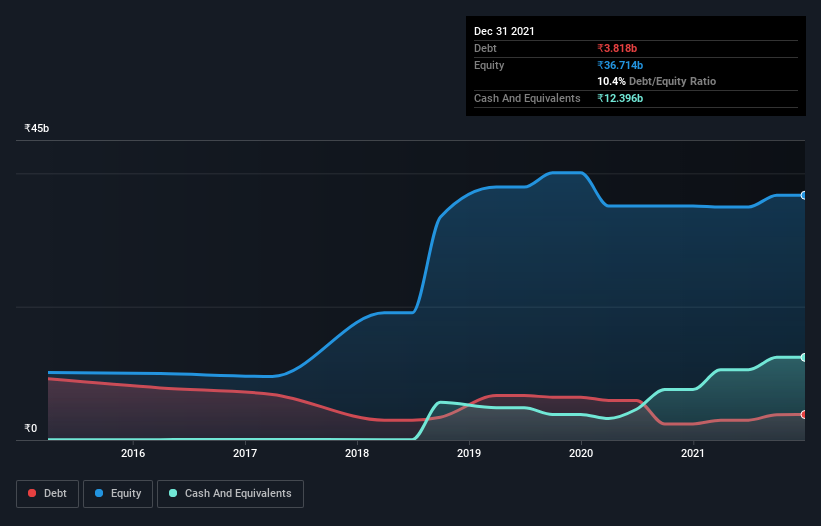
Some say volatility, rather than debt, is the best way to think about risk as an investor, but Warren Buffett famously said that 'Volatility is far from synonymous with risk.' So it might be obvious that you need to consider debt, when you think about how risky any given stock is, because too much debt can sink a company. We note that HEG Limited (NSE:HEG) does have debt on its balance sheet. But is this debt a concern to shareholders?
What Risk Does Debt Bring?
Debt assists a business until the business has trouble paying it off, either with new capital or with free cash flow. Part and parcel of capitalism is the process of 'creative destruction' where failed businesses are mercilessly liquidated by their bankers. However, a more frequent (but still costly) occurrence is where a company must issue shares at bargain-basement prices, permanently diluting shareholders, just to shore up its balance sheet. Of course, plenty of companies use debt to fund growth, without any negative consequences. When we examine debt levels, we first consider both cash and debt levels, together.
Check out our latest analysis for HEG
What Is HEG's Debt?
The image below, which you can click on for greater detail, shows that at September 2021 HEG had debt of ₹3.82b, up from ₹2.41b in one year. However, its balance sheet shows it holds ₹12.4b in cash, so it actually has ₹8.58b net cash.

A Look At HEG's Liabilities
Zooming in on the latest balance sheet data, we can see that HEG had liabilities of ₹8.08b due within 12 months and liabilities of ₹1.06b due beyond that. On the other hand, it had cash of ₹12.4b and ₹4.69b worth of receivables due within a year. So it actually has ₹7.95b more liquid assets than total liabilities.
It's good to see that HEG has plenty of liquidity on its balance sheet, suggesting conservative management of liabilities. Because it has plenty of assets, it is unlikely to have trouble with its lenders. Succinctly put, HEG boasts net cash, so it's fair to say it does not have a heavy debt load!
Although HEG made a loss at the EBIT level, last year, it was also good to see that it generated ₹3.0b in EBIT over the last twelve months. The balance sheet is clearly the area to focus on when you are analysing debt. But it is HEG's earnings that will influence how the balance sheet holds up in the future. So if you're keen to discover more about its earnings, it might be worth checking out this graph of its long term earnings trend.
Finally, a company can only pay off debt with cold hard cash, not accounting profits. HEG may have net cash on the balance sheet, but it is still interesting to look at how well the business converts its earnings before interest and tax (EBIT) to free cash flow, because that will influence both its need for, and its capacity to manage debt. During the last year, HEG burned a lot of cash. While that may be a result of expenditure for growth, it does make the debt far more risky.
Summing up
While it is always sensible to investigate a company's debt, in this case HEG has ₹8.58b in net cash and a decent-looking balance sheet. So we don't have any problem with HEG's use of debt. When analysing debt levels, the balance sheet is the obvious place to start. But ultimately, every company can contain risks that exist outside of the balance sheet. To that end, you should be aware of the 2 warning signs we've spotted with HEG .
When all is said and done, sometimes its easier to focus on companies that don't even need debt. Readers can access a list of growth stocks with zero net debt 100% free, right now.
Valuation is complex, but we're here to simplify it.
Discover if HEG might be undervalued or overvalued with our detailed analysis, featuring fair value estimates, potential risks, dividends, insider trades, and its financial condition.
Access Free AnalysisHave feedback on this article? Concerned about the content? Get in touch with us directly. Alternatively, email editorial-team (at) simplywallst.com.
This article by Simply Wall St is general in nature. We provide commentary based on historical data and analyst forecasts only using an unbiased methodology and our articles are not intended to be financial advice. It does not constitute a recommendation to buy or sell any stock, and does not take account of your objectives, or your financial situation. We aim to bring you long-term focused analysis driven by fundamental data. Note that our analysis may not factor in the latest price-sensitive company announcements or qualitative material. Simply Wall St has no position in any stocks mentioned.
About NSEI:HEG
HEG
Manufactures and sells graphite electrodes in India and internationally.
Flawless balance sheet with high growth potential.
Similar Companies
Market Insights
Community Narratives



